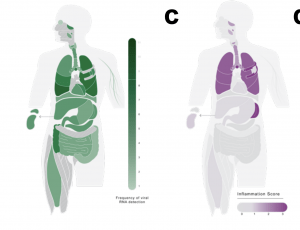
Mapping SARS-CoV-2 organotropism and cellular distribution in fatal Covid-19 in relation to local inflammation. Distribution of individual patient viral RNA presence within organs plotted against time interval between illness onset and death compared with semi-quantitative score of organ specific inflammation for each patient.
Disclaimer: This is a summary of an article that is in a preprint and has not been peer reviewed.
A recent preprint article in Medrxiv explored whether inflammation in COVID-19 is a direct response to presence of the virus in organs or an independent immuno-pathologic process. Post-mortem tissue samples were obtained from 11 hospitalized patients with fatal COVID-19 and assessed for presence of SARS-CoV-2 RNA and proteins alongside histological evidence of inflammation/tissue damage.
The authors found widespread but variable distribution of viral RNA and S protein in tissues, most frequently in the respiratory tract and to lesser degree in the liver, gastrointestinal (GI) tract and kidney. However, the inflammatory response was discordant with sites of viral infection, the lungs and reticuloendothelial system being the exclusive sites of severe inflammation. No acute abnormalities of the GI tract or endocrine organs and no cases of myocarditis were reported despite frequent detection of viral RNA in these tissues. Bronchopneumonia and diffuse alveolar damage were observed in lung sections with or without viral presence. Further, infiltration of mononuclear cells, macrophages, CD4+ and CD8+ T cells into pulmonary arteries was noted in 2 patients in whom the S protein was not detected in the endothelium.
These findings reveal that tissue inflammation and organ damage in COVID-19 may not be consistent with viral distribution. The authors conclude that: “death in Covid-19 is primarily a consequence of immune-mediated, rather than pathogen-mediated organ inflammation and injury.”
Article: Doward et al,Pre-print. Tissue-specific tolerance in fatal Covid-19. medRxiv
Summary by Kenneth Omollo










